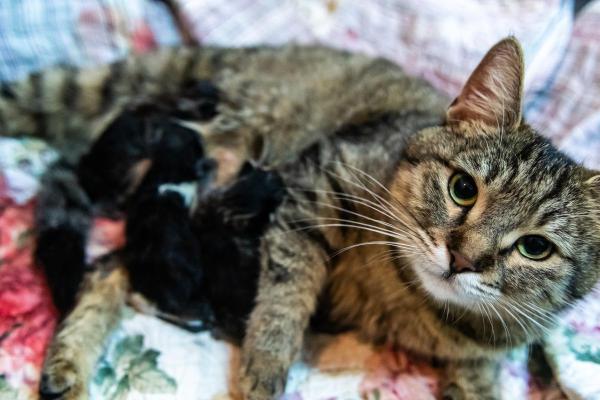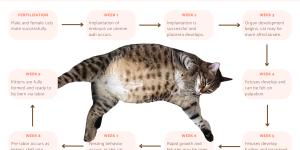Dead Kitten in a Cat's Litter



See files for Cats
When a kitten in a cats litter has died, it is understandable for us to be upset at the loss of life. The average kitten litter is around 4-6 newborns, but there could be even more. Unfortunately, it is relatively common for a kitten to die during various stages of the 63-6y days of an average cat gestation. When this happens, we may be unsure of how the mother cat feels. While it is understandable that humans will try to conceptualize the emotions of our feline companions, it is important to know that a mother cat will not experience this as a trauma. They are more driven by survival instinct, something which can help us to know what to do as a caregiver to the mother and her newborns.
At AnimalWised, we look at what happens when there is a dead kitten in a cat's litter. We discover what processes the mother cat will go through and find out whether we should intervene and remove the dead kitten from the litter.
What do cats do when a kitten dies?
As we have stated in the introduction, cats are biologically programmed to guided by their survival instinct[1]. This encourages them to protect their kittens and helps them know what to do to ensure their healthy development. Despite this, they will also have their own unique temperament which is influenced by many factors related to their experience. For this reason, there may be some variations in how a mother cat reacts to the death of a kitten.
Generally speaking, mother cats will do the following when a kitten dies:
- Try to revive them: when they notice that a kitten is not moving, is not feeding or is colder than the rest, some mother cats feel the urge to revive it by licking it insistently.
- Search and meow incessantly: if the dead kitten has been removed, the mother may follow their scent to try to find them. If this does not happen, they may become restless and meow for a prolonged period. This restlessness usually subsides after a few hours and the cat regains focus on caring for her live kittens.
- Eat the kitten: it is common for a mother cat to eat a dead kitten if they have not been revived. There are different reasons for this. One of the most important is that the presence of a dead kitten can negatively affect hygiene and pose a risk to the other kittens. Eating them will better ensure their health. Also, the nutrients the kitten provides can help the mother cat during this time.
- Push them away: if the mother cat does not eat her dead kitten, she may simply reject it. As a means of better ensuring hygiene, she will push the deceased newborn to the side of her nest after she has cut the amniotic cord and eaten the sac. If this is the case, we should remove the kitten ourselves to avoid the spread of bacterial infection.
- Intensify attention to the rest of the litter: some cats can become stressed and show extreme attention to their surviving kittens. They remain constantly alert and neglect their sleep because they perceive any stimulus as a possible threat to their offspring.
- Neglect the litter: other cats may experience the opposite reaction. Instead of providing warmth, comfort, food and general care of the newborns, they will neglect their feline instinct and appear apathetic. In this way, the mother is rejecting her kittens. This is particularly common in first-time mothers, especially if it is a large cat litter size. It is not something we should scold them for, but we will need to provide care for the kittens.
You can read our related guide to know what to do when caring for rejected kittens. It provides the steps you need to follow to ensure their health away from their mother.

Symptoms of a dead kitten inside the cat
It is important to note that in the majority of cases, the cat's pregnancy should go smoothly and not have any need for our intervention. If they are healthy and we provide them with a quiet and clean space, their labor should go without any serious issues. Despite this, complications can occur. When there is a dead kitten in the litter, we know they are stillborn. Unfortunately it is also possible for a miscarriage to occur without the kitten being birthed.
When we see a stillbirth in our cat's litter, it is important to know if there are any other dead kittens still inside the mother. The following the main symptoms that a dead kitten is inside the cat, showing the mother cat:
- Expelling a brown liquid with a strong, unpleasant smell. It may be indicative of a uterine infection or the existence of a dead kitten inside her.
- Hemorrhaging an abnormal amount of blood (some blood is common during parturition.
- Stops being active during childbirth. Brachycephalic cat breeds such as Persians and Exotic Shorthairs are prone to dystocia (difficulty giving birth) due to the size of the kittens' skulls. Go to the vet without delay if 4 hours have passed between the birth of one kitten and the next. In these cases, it will be necessary to perform a cesarean section.
In the case of brachycephalic cat breeds, it is possible your veterinarian will schedule a cesarean section due to the increased likelihood of dystocia. For this reason and many others, it is important to take the cat to a veterinarian when we know they are pregnant. This way we can monitor the pregnancy and best troubleshoot any potential complications in a cat's labor.
Learn more about the c-section in cats and what it entails with our related guide.
Do cats suffer when their kittens die?
While cats certainly do have emotions, it is important to know they do not approach birthing their young in the same away as humans. Their drive will be an instinctual need to care for their young to propagate their species. In the case of a kitten death, the mother cat will be much more preoccupied with ensuring the well-being of her remaining offspring.
With this in mind, it is important not to look at their actions as incorrect. While it would be horrific for a human to eat her young, cats do this as a necessity for survival. It is not a moral action and we should not treat it as such, even if it is unpleasant.
This perspective does not mean the mother cat is completely undisturbed by a stillbirth. There is some evidence to suggest cats become depressed after the death of a beloved family member[2]. This is particularly the case when they lose a guardian. The loss of a kitten will not likely have a strong emotional impact, but some cats can be more sensitive than others. We may notice some signs of anxiety or depression.
Learn more about cat depression in our related guide.
Should I remove a dead kitten from a litter?
Even if all were born without problem, it is possible you see a kitten has died overnight. This may even happen a few days after parturition. This is because the kitten may be strong enough to survive a couple of days, but no longer. In most of the cases, the mother cat will behave in one of the ways detailed above. It is not common for us to need to intervene, with the exception of the removal of a dead kitten that has been pushed away.
We may not know the cause, but it is believed that most dead kittens are due to some type of virus[3], a congenital disease or another complication during childbirth. For this reason, we should monitor for any changes or symptoms in the newborn kittens. If we observe any of these signs, take them to a veterinarian immediately.
In addition to treating any disease, it is important that the specialist examines the mother cat to certify that she is fine. Maximizing the supply of nutrients and hydration, as well as offering her a safe and calm environment in which she feels accompanied, is ideal to help her recover from this ordeal. If a kitten has survived, ensure that their mother does not ignore them. Otherwise, you will have to take care of them and ensure they are fed.
Learn more about possible complications during gestation with our article on why a pregnant cat is leaking fluid.

If you want to read similar articles to Dead Kitten in a Cat's Litter, we recommend you visit our Gestation category.
- Sanchez, A.E., & Silva, M.E. (2002). Pregnancy biology in the domestic cat (Felis catus). Archives of Veterinary Medicine , 34(2), 147-156.
- Collard, R. R. (1967). Fear of strangers and play behavior in kittens with varied social experience. Child Development, 877-891.
- Velázquez, M. A., & Nuñez, H. (2006). Pregnancy failure and neonatal losses in the domestic cat (Felis catus). Veterinary Magazine, 17(2), 113-121.






